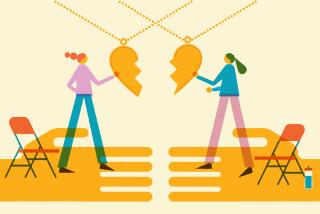A teen’s friends are a powerful influence
- Share via
My parents had it pretty easy with me when I was a teenager. I was a bit of a nerd. I earned straight A’s in school, ran for student government and spent much of my free time watching reruns of “Little House on the Prairie.” And they had little to complain about when it came to my friends — most of them were as straight as I was. My mom and dad considered them a positive influence.
Many parents aren’t nearly this lucky. Their teens run with kids who prefer partying to homework or fistfights to team sports. It’s only natural for these parents to worry about the way their children are being influenced. And it’s only logical for them to wonder: Should I allow my child to spend time with these kids at all?
“It’s a tricky issue,” says Mitch Prinstein, director of clinical psychology at the University of North Carolina at Chapel Hill and editor of the Journal of Clinical Child and Adolescent Psychology. “It’s a fair and appropriate question for parents to be asking themselves.”
The influence that friends exert over one another as teenagers is clearly powerful and, far too often, undesirable. Unhealthy behaviors can be almost contagious among kids this age. Teens whose friends smoke, drink or use drugs, for example, are more likely to indulge in these behaviors themselves. Aggressive, illegal or self-injurious behaviors also have a tendency to cluster among friend groups, as do concerns about body image and eating.
A study published in February in the Journal of Early Adolescence showed that friendships can also make the difference between good and bad grades at school. Researchers at the University of Oregon surveyed more than 1,200 middle school students and asked them to identify their three best friends. They found that students whose friends were prone to misbehave didn’t do as well in school as kids whose friends were socially active in positive ways, such as participating in sports at school or completing their homework on time.
Even though it’s easy for parents to blame their children’s bad behavior on peers and assume that other kids coerce them into doing things like drinking, smoking, stealing or cheating, poor decision-making among teens isn’t all about pressure. Kids actively want to emulate their peers. During adolescence, they are looking for ways to separate from their families and begin to define themselves as individuals. To that end, they turn to friends for guidance and direction. They tend to mimic their peers’ behaviors and adopt the same attitudes. Conforming to social norms helps them redefine themselves while earning them acceptance and approval. Fitting in simply feels good.
Parents, discouraged by the changes they see in their children, naturally try to intervene. They may encourage their kids to spend less time with friends they perceive as troublemakers or forbid these friendships entirely. But interfering in a teenager’s life too much, particularly with friendships, can make matters worse. “Meddling with children’s relationships has a high potential for backfiring,” Prinstein says. “It can actually fuel rebellion.”
There are things parents can do, however, to temper the influence that teenagers have on one another. “Helping your child develop a sense of identity and feel secure in that identity is probably the best antidote,” Prinstein says. That’s not easy. Adolescents can no longer be told what to believe or how to behave. They have to be allowed to develop their own sense of what’s important.
Teens require a certain amount of independence. But that doesn’t mean they should have free rein. Adolescents aren’t exactly known for their good decision-making, and parents need to impose some boundaries. When rules are broken and friends are involved, there need to be consequences — reasonable ones. Rather than trying to break up a friendship, parents might want to “ground” a teen’s social life, allowing the child to see friends at home under watchful parental eyes but not to go out with them.
The good news is that adolescence doesn’t last forever. Kids are most susceptible to their peers’ influence during middle school, around the age of 13 or 14. By high school, there’s already a dramatic shift in the way their brains are working, and the sway that other kids hold over them isn’t nearly as strong.
I have two teenage daughters, and both have wonderful friends. The girls they choose to spend time with are hard-working and bright, and I can count on them to make good choices most of the time. It’s my 9-year-old son I worry most about at this point. Though with him, I’m not sure what I’m most afraid of: The influence his friends will have over him or the naughty behavior he’ll model for his pals.
Ulene is a board-certified specialist in preventive medicine in Los Angeles. The M.D. appears once a month.






